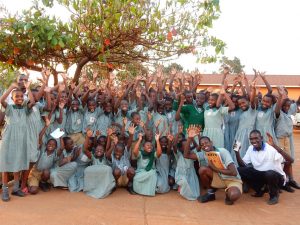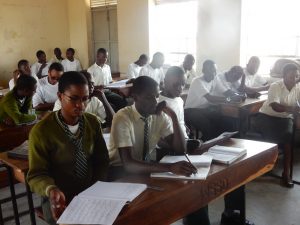Education Sponsorship Programme
 Education can have significant outcomes for any individual. For a deaf child, it contributes to a strong foundation for language development. Without education, many deaf children are doomed to a life of vulnerability and face a bleak future that limits access to life opportunities and increases exposure to physical, emotional and psychological abuse. Serious implications relate to language deprivation include intense isolation and low self-esteem, yet the majority of deaf children in Uganda do not go to school, most especially those living in remote rural areas.
Education can have significant outcomes for any individual. For a deaf child, it contributes to a strong foundation for language development. Without education, many deaf children are doomed to a life of vulnerability and face a bleak future that limits access to life opportunities and increases exposure to physical, emotional and psychological abuse. Serious implications relate to language deprivation include intense isolation and low self-esteem, yet the majority of deaf children in Uganda do not go to school, most especially those living in remote rural areas.
 Due to the high level of out of school deaf children, DLU embarked on this initiative in 2012. The organisation began by identifying marginalized deaf children, targeting those who are orphaned and experiencing poverty. Programme activities include financing the education of deaf children and providing scholastic materials to enable them attend school to acquire knowledge and skills and open up various life opportunities. The programme creates possibilities that widen a deaf child’s horizons – raising the child’s profile and improving their lives in all dimensions of human growth and development. While in school deaf children meet and interact with deaf peers, learn to socialize and most importantly acquire language and communication skills. Our deaf children are enrolled in both formal and non-formal (skills-based) educational settings throughout the country as well as in neighbouring Kenya. To ensure that deaf children maximize their potentials, DLU closely monitors them through School and Home Visits, which are an integral activity of our investment in the deaf child. Deaf adults from the DLU staff team follow up the educational progress of the child and overall wellbeing and also act as role models, not only for the sponsored child, but for all deaf children at the school. DLU is able to interact with teachers and the children providing guidance and counseling during visits.
Due to the high level of out of school deaf children, DLU embarked on this initiative in 2012. The organisation began by identifying marginalized deaf children, targeting those who are orphaned and experiencing poverty. Programme activities include financing the education of deaf children and providing scholastic materials to enable them attend school to acquire knowledge and skills and open up various life opportunities. The programme creates possibilities that widen a deaf child’s horizons – raising the child’s profile and improving their lives in all dimensions of human growth and development. While in school deaf children meet and interact with deaf peers, learn to socialize and most importantly acquire language and communication skills. Our deaf children are enrolled in both formal and non-formal (skills-based) educational settings throughout the country as well as in neighbouring Kenya. To ensure that deaf children maximize their potentials, DLU closely monitors them through School and Home Visits, which are an integral activity of our investment in the deaf child. Deaf adults from the DLU staff team follow up the educational progress of the child and overall wellbeing and also act as role models, not only for the sponsored child, but for all deaf children at the school. DLU is able to interact with teachers and the children providing guidance and counseling during visits.
 Deaf children are sponsored in either special schools for the deaf or mainstream (inclusive) schools. During home visits, we interact with parents, siblings and family members of the deaf child to ensure a deaf-friendly family environment that values the deaf child as an equal member of the family unit. Parent support services such as counseling are provided to increase deaf awareness and appreciation of the deaf child as a potential member of family. In addition to providing skills in sign language to hearing members of the family to facilitate communication.
Deaf children are sponsored in either special schools for the deaf or mainstream (inclusive) schools. During home visits, we interact with parents, siblings and family members of the deaf child to ensure a deaf-friendly family environment that values the deaf child as an equal member of the family unit. Parent support services such as counseling are provided to increase deaf awareness and appreciation of the deaf child as a potential member of family. In addition to providing skills in sign language to hearing members of the family to facilitate communication.
